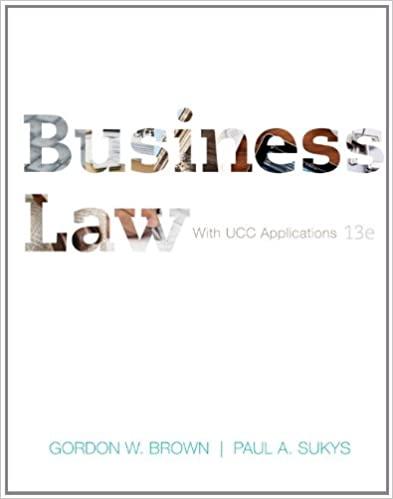The Superior Savings Association, a reputable savings and loan institution with a long history of serving the
Question:
The Superior Savings Association, a reputable savings and loan institution with a long history of serving the Lithuanian community in Cleveland, owned a properly recorded first mortgage on a two-story brick building located at 6802 Superior Avenue in the city. The building was located just across the street from one of the branches of Superior Savings in the heart of the Lithuanian community, and one of the bank’s officers passed the building every morning on his way to work.
The building also held special significance in the neighborhood because it had once housed the main office of Cleveland’s only Lithuanian newspaper. You can, therefore, imagine the banking officer’s surprise when he arrived at work one morning to find that the building was, to say it bluntly, gone. As he pieced together the story, the officer learned that the mortgagor, Hughes, had failed to keep the building in an appropriate state of repair. As a result the city condemned the building.
As a final warning, the city gave Hughes more than two months to make the needed repairs before the building would be demolished. When Hughes failed to comply, the building was torn down. At no time during the two month grace period did anyone at Superior Savings receive any notice of the impending demolition by the city. Superior Savings sued, arguing that the city had violated the association’s constitutional rights by “taking away” its property without giving it proper notice.
Attorneys for Superior Savings argued that the city, as an agent of the state, had deprived the banking institution of its constitutional rights under the Due Process Clause of the Fourteenth Amendment to the U.S. Constitution.
In addition, the city had also violated its own ordinances which also require that it give notice of the impending demolition to Superior Savings. Had the city followed its own procedures and complied with Constitutional law, the bank would have been properly notified and could have taken steps to save what had become a local landmark, despite its state of disrepair.
As it is, there is no way to undo the damage that has been done. Therefore, Superior Savings asked the court to grant the institution a monetary award that would provide it with money damages that would be equal to the amount that the mortgage was worth just before it was torn down and its value after being destroyed.
The measurement of that value would, of course, take some fancy calculating, given the historical nature of the building, but it would ultimately be worth it to Superior Savings. (See Superior Savings Association v. City of Cleveland, 501 F. Supp. 1244 (U.S. District Court, Northern District of Ohio).)
Question
1. Under what theory or legal argument can an institution like a savings and loan association claim constitutional rights? Explain.
2. Would it make a difference in this case if the savings and loan owned the mortgage but had not recorded it? Could the savings and loan use the same argument in that scenario? Why or why not?
3. Did Hughes violate any duty or duties to Superior Savings? Explain.
4. What if there was another mortgagee out there with a recorded mortgage? How would that fact affect this case (or would it)? Explain.
5. Has Superior Savings been fair and reasonable in its request for damages? Explain.
Step by Step Answer:

Business Law With UCC Applications
ISBN: 9780073524955
13th Edition
Authors: Gordon Brown, Paul Sukys





